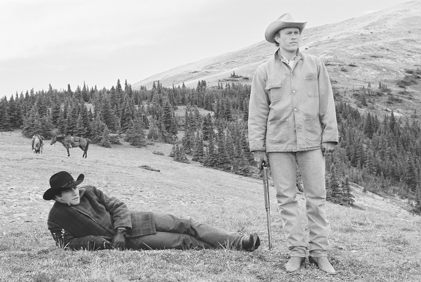There are two “Brokeback Mountains”—the movie, and it is a strong one, and the other, which is the impact its release will have on the nationwide cineplex audience. The most pertinent question is what impact the film will have on attitudes in those solidly Republican redoubts known as the red states.
The mainstream media and Variety are on top of the audience story. We will know if the audience is old or young, male or female, highly educated or high school graduates. Critics for the most part are giving the film exceptionally strong reviews, which will surely encourage wider attendance than such a story might otherwise receive.
The film is specifically getting the right buzz to encourage younger audiences. Jake Gyllenhaal, who earlier this month turned 25, showed real courage by agreeing to bottom. The tent scene will provoke a strong curiosity factor.
The big mystery is how will audiences be affected. The movement for marriage equality desperately needs to persuade Americans that gay men can love each other. One common belief associated with opposition to gay marriage is that men don’t love each other; that it’s just about the sex, and lots of it, with many partners. The relationships, from this perspective, are carnal and don’t merit the sanctity of marriage.
“Brokeback Mountain” provides a response to this stereotype—an emphatic yes that men can love each other and yes it also happens to be a sexual love. I hope that the film gives Americans a framework for accepting that men in our society have loving relationships.
The alternative is almost too dismal to contemplate—that gays are only bunnies hopping in and out of bed, engaged in acts too “dirty” to be accepted by good and right-thinking people. Our community must present the example of so many committed male couples to rebut the assumption that promiscuity is the only option for gay men.
The good news is that “Brokeback” is opening faster and on more screens than originally planned. Even the Carmike movie chain that operates in small towns of less than 50,000 is considering screening the film. Older audiences have unexpectedly shown an interest, and the film is attracting both men and women.
Variety reports that “Brokeback” is the first film since 1995 to break into the top 10 while screening in fewer than 100 locations. The off-the-chart numbers of the first week have receded to a more normal per-screen average of $8,803. That is a totally respectable number considering that virtually every other blockbuster and art film is competing for audience share during the busy holiday season. “Brokeback” is booking slightly more money per screen than Steven Spielberg’s highly regarded film on the aftermath of the 1972 Olympic terrorism, “Munich.”
There is no surprise here. A Marlboro-Man gay film is almost guaranteed to generate strong interest. For those readers too young to remember, Marlboro became the biggest selling filtered cigarette boosted by an ad campaign featuring cowboys and outdoor men. That imagery obliterated the predominant bias that filters were a feminine accommodation. Marlboro—fraudulently, of course, implying that the filter made the cigarette safe—went on to replace Camels, Chesterfields, and other brands as the market leader.
Such analysis may be off-putting for many. Only minds warped by constant focus on politics will want to consider this film from such a crass perspective, and I plead guilty to this charge. I recognize that my perspective does a grave injustice to the feelings that the movie successfully evokes. “Brokeback” is not a political tract, it’s a love story.
And I loved this film. It brought back bitter memories of my late adolescent heartaches that I had forgotten.
Heath Ledger’s character Ennis Del Mar encapsulated my emotional turmoil during the 1950s and ‘60s. He matter of factly tells his partner good-bye after a summer of love and sheep herding in the Wyoming mountains. The separation seemed devoid of feeling; they might as well have been two guys finishing a shift saying, “I’ll see you tomorrow.” Once he is alone, Ennis breaks down and sobs deeply and tells a well-meaning passer-by to give him some privacy. He will not disclose his love. By a pernicious act of will, Ennis’ feelings are hidden even from his lover.
That is his closet and it’s a deep, dark one that I recall so well. It wasn’t that I succeeded in hiding my feelings—in retrospect they were fairly obvious to others—but I had such bad luck whenever I first declared my gayness when I was 10, 11, and 12 that I simply refused to open my heart to anyone, friend or homophobe. And of course, I was unable to recognize the many caring people who were trying to help me; I was supremely successful in fortifying my loneliness.
There are closets, and there are closets. For me, just coming out to other gay men was a major step, and for a long time I mostly preferred secret sex in bathrooms and bathhouses. As a part of that world, I lied to everyone. The lies repelled affection. In such a closet, madness hovers; it becomes difficult, if not impossible, to imagine that another person can offer support, much less the warmth of friendship and love.
“Brokeback” revived the memories of this depressing isolation in ways that shook me to the core.
The fine acting and directing are impressive, but what transforms this film into a superior movie is the insight that the original author, Anne Proulx, and the screenwriters bring to the story.
“Brokeback Mountain” took me back 50 years and reminded me how fragile we become if we can’t share our feelings in a supportive society. The film is not a plot-driven western, it is an affecting reminder of what happens when love is denied.
gaycitynews.com
































